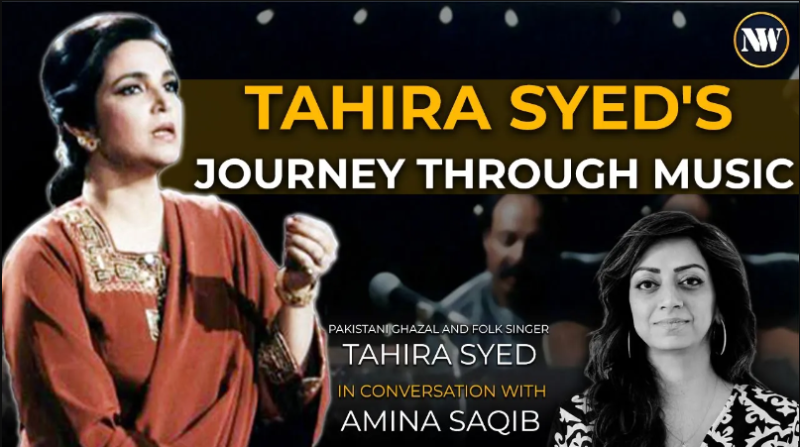In the realm of Pakistani music, few names shine as brightly as Tahira Syed's. An iconic figure in the industry, she carries with her not only a mesmerizing voice but also a rich heritage deeply intertwined with the world of melodies and rhythms. In a recent episode of New Wave Global, host Amina Saqib delves into an illuminating conversation with Tahira Syed, uncovering her journey, struggles, and profound insights on preserving culture and identity through music and family values.
Born into a family steeped in music, Tahira Syed's introduction to the world of melodies was a natural progression. As the youngest of six siblings, she inherited a legacy that demanded her attention. Her mother's aspiration for at least one child to embrace singing as a profession led Tahira down a path she would eventually embrace wholeheartedly. With her mother's determination guiding her, Tahira embarked on a journey that would lead her to grace television screens with her ethereal voice.
Tahira Syed's story is one of balancing passion and practicality, music and academics. Amidst a demanding singing career, she managed to pursue her legal education, a feat that reflects her determination and resilience. Tahira candidly recounts the challenges she faced while juggling these two disparate worlds. Her story is a testament to the delicate balance between pursuing one's dreams and navigating the responsibilities of education and professional growth.
Stepping out of her mother's illustrious shadow was both a privilege and a challenge for Tahira. As the daughter of the legendary Malika Pukraj, her unique journey involved not just carving her own path but also honoring her mother's indelible musical legacy. Tahira's voice may be distinct, but the essence of her mother's influence remains woven into her own artistic narrative. She acknowledges that being recognized as Malika Pukraj's daughter has been both a blessing and a defining aspect of her career.
As Pakistan's musical landscape evolves, artists are reimagining classic songs to bridge generational gaps. Tahira applauds this trend, crediting contemporary platforms like Coke Studio for reintroducing old melodies with a modern twist. These adaptations breathe new life into timeless tunes, fostering a connection between younger audiences and Pakistan's rich musical heritage. The revitalization of classic songs showcases the enduring power of music to transcend time and touch hearts across generations.
Tahira's perspective on Pakistan's current state is candid and sobering. She acknowledges the economic struggles and inflation that have disproportionately affected the underprivileged. In a nation grappling with these difficulties, Tahira emphasizes the vital role of charity and giving back. Her poignant words underscore the need to contribute to organizations that provide free food to those who cannot afford basic necessities.
Tahira's message to the diaspora and the younger generation is both poignant and heartfelt. She urges them to hold steadfastly onto their cultural identity, language, and traditions, even while embracing their host countries. Her advice resonates with the importance of instilling pride in being Pakistani, celebrating Pakistani festivals, and fostering a connection to the motherland. Tahira's call to dress children in Pakistani attire and uphold the spirit of Pakistani culture serves as a reminder that heritage is a cherished and unbreakable thread that connects us to our roots.
As the conversation draws to a close, Tahira treats the audience to a brief but enchanting snippet of her melodious voice. The humble tribute encapsulates the essence of her artistry, reminding listeners of the beauty and depth of her singing talent.

